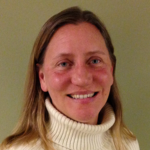
13 Dec Interview with Nicola McCarthy and Emily Anderson of Horizon Discovery

Emily has managed projects involving the development and application of gene engineering and gene modulation technologies, including Dharmacon™ ON-TARGETplus™ siRNA and Accell™ siRNA, as well as the introduction of Dharmacon™ Edit-R™, the first rationally-designed, genomewide library of synthetic CRISPRs for gene disruption. She received a Ph.D. in Biochemistry from the University of Colorado at Boulder on the structure and function of protein:single-stranded DNA interactions at telomeres. At Dharmacon she has worked extensively on the mechanism, function, specificity, and delivery of RNA interference (RNAi) and its applications. Read her full bio.
Interview with Nicola McCarthy and Emily Anderson of Horizon Discovery
Q: What products and services do Horizon Discovery offer to address the needs of the precision medicine research community?
A: Data from genomic screens are enabling the right drug to be prescribed to the right person at the right time. This is the essence of personalized medicine and Horizon Discovery is at the forefront of driving forward this powerful new model.
Translational genomics is a crucial component in the development of precision therapies and Horizon Discovery’s capacity to generate precisely engineered cell lines and in vivo models is helping to validate hypotheses generated from genomic studies. By editing the human genome, the effects of genetic variation found in patients can be reproduced in a laboratory setting, enabling important biological questions to be addressed much earlier in the drug discovery process. Horizon Discovery also employs its state-of-the-art CRISPR–Cas9 screening platform to examine gene–gene and gene–drug interactions in vitro and in vivo, enabling the identification of genetic dependencies that can be exploited in drug development, and likely routes to resistance in the clinic, as well as mutations that might lead to an increase in sensitivity to a given drug.
Horizon Discovery offers products in the form of gene modulation reagents (siRNA, shRNA and sgRNAs) that can be bought as single agents or as a screening library to aid research on precision medicine approaches. We offer engineered cell lines and animal models that can be applied in understanding complex biological process or the identification and validation of a new druggable target. Horizon also offers a comprehensive set of services, that includes the generation of tailored engineered cell lines and animal models, high-throughput cell line panel drug screens, and bespoke CRISPR knockout, activation (CRISPRa) and inhibition (CRISPRi) screens.
Q: What makes Horizon Discovery unique?
A: Horizon Discovery understands in detail the products and services that it offers. Our scientists have developed and road tested these, and can give expert advice when providing cell-based solutions to the challenges that our clients and customers face. We can help our customers ask the right questions using an optimal cell-based platform and we can provide solutions for the tribulations that arise in all aspects of biological research. Indeed, the breadth of products and services offered by Horizon Discovery is one of the characteristics that makes the company unique: from understanding the fundamentals of a cellular system by generating an in vivo model to providing reference standards for CLIA labs carrying out diagnostic assays; from target identification in primary immune cells to combining new biologicals with standard of care drugs in oncology; and from generating a reporter cell line for a bespoke drug discovery assay to improving the production of biologicals in CHO cells. We achieve all of this through applying the latest gene engineering technologies.
Q: What is your role at Horizon Discovery and what excites you about your work?
Emily Anderson: I am a senior scientist in the product development group at Horizon’s Colorado site. I lead projects to develop applications of gene modulation and gene engineering in mammalian cells. While technologies like RNA interference and CRISPR-mediated gene knockout and gene editing have revolutionized many aspects of basic biology, getting these tools into the hands of all researchers and maximizing their efficiency, specificity, and ease-of-use has been my passion for the last fifteen years. I’m excited to work in a dynamic environment with others who are also engaged and committed to advancing science and improving human health. I like the discovery that comes along with experimentation and lab-based science, but also using the knowledge I’ve gained to solve real-world problems and connect into a larger picture of the work we’ve done.
Q: When thinking about Horizon Discovery and the domain Horizon Discovery is working in, what are some of the recent breakthroughs that are propelling the field forward and how will they impact healthcare?
A: Aside from the aspects already discussed re CRISPR–Cas, the capacity to more easily edit the human genome has brought the treatment of rare diseases to the fore. These have been largely overlooked in the past for many different reasons, but if nuclease-mediated gene editing proves to be a new form of surgery in which a rogue gene can be effectively removed from a cell outside of the patient and the repaired cells re-infused with few long terms side effects, then some of the monogenic rare diseases might be more effectively treated.
Q: What are the short-term challenges that Horizon Discovery and its peers are facing?
A: Most of the short-term challenges involve simply keeping up with the pace of change in terms of gene editing capabilities and the widespread use to which CRISPR–Cas and other nucleic-acid-interacting nucleases are being put. Understanding how and where these nucleases lead to off-target effects is also an important area of the field, as is detecting these changes efficiently in engineered cells.






